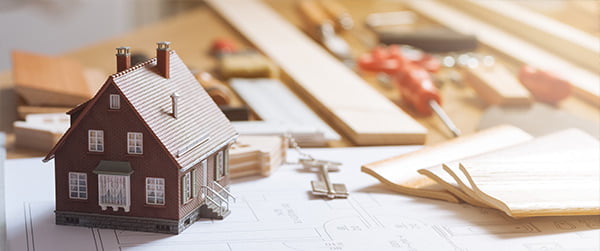Working With A Builder

When you buy a home from a builder, the salesperson is selling you a dream of a future life, not the reality of the process in the present moment. Let’s take a closer look at the overall process when purchasing a newly built home.
Once you have decided on a builder, you will follow their process; every builder is different, as is their process. Regardless of your ideal outcome, you must follow the builder’s process until completion.
Basic Steps
Below is what you will typically experience when dealing with a builder but not necessarily for every builder.
The majority of builders will want a deposit to write the contract. The deposit ensures your sincerity ( $5000 is typical). The initial deposit will make up part of your overall down payment once the home is complete.
You may even require a pre-approval letter before writing the offer with the salesperson.
Your signed contract will contain a deposit schedule for the remaining funds the builder requires to secure your lot and building. It’s essential to know; you will need to have these funds on hand or a line of credit to cover the deposits. Once the deposits are in trust with the builder, you will go to the design center and pick your new home’s materials. Please be mindful of your budget and pre-approval amount. It’s easy to get excited and overspend.
Deposits and Down Payment
Maybe you were expecting to use a 10% down payment for your purchase, but the builder requires a 20% in deposits. NO problem. Again, during the building process, you will follow the builder’s rules and provide the builder with the prescribed amount of deposits, typically four or five deposits, totaling a specific amount or a percentage.
Approximately 120 days before the expected closing date, we will start the final mortgage process. At this time, we will discuss the desired down payment amount you would like to utilize. As long as you qualify, your down payment can be as little as 5% regardless of the deposits you have given the builder.
In this case, the funds you have on deposit with the builder will be refunded to you at the lawyer’s office when final numbers are determined and you are ready to take possession of your new home.
Typically we start to work on the final mortgage approval once you receive your occupancy notification. If you are purchasing a condo, you may receive occupancy, but not the registration. You will technically be renting from yourself until the registration of the building. Meaning your mortgage will be ready but not registered to the title of the unit. Not to worry, you will not be making mortgage payments until registration. We can discuss it further.
You will typically have several proposed closing dates. Once the builder is close to completion, they will notify you and give you a 30-day notice.
Fundamental Things To Know:
Once you have the initial contract, please send it to me. I will need the contract to process your initial mortgage or letter for the builder.
Once you have your contract, keep a copy of everything in a safe place, preferably an electronic file, label your documents. These steps will become important later on.
Please keep all of your deposits, change orders, or upgrade statements receipts together; you will need them near the end of the process. These documents make up your legal and binding final contract even if you paid cash for some of the upgrades.
Please send any change of date notifications you receive from the builder.
Before the completion of your home, you will do a walkthrough with a representative of the builder. PDI = Pre Delivery Inspection. You will receive a statement of adjustments that outlines your purchase price, upgrades, deposits, taxes, and a final balance owing. Typically this happens a week before possession of the home. Send this document to me; your lawyer and the insurance company will need this document as well.
Obtain Legal Advice – have a lawyer review your contract.
Warranties: Most builders will provide some guarantees for their work. Please make sure you understand what your builder’s warranty covers and for how long they last.
Some upgrades, such as CAT-V ethernet, DSS satellite, or security wiring inside the walls, are easier to do before construction.
Waiting for your keys
Now the waiting game begins. Between now and the time you receive your keys, it is so essential that you maintain or increase your credit rating as is today. If you need to make a large purchase that will require a monthly payment, please call me. Please do not change jobs without letting me know.
These may seem obvious, but you would be surprised by how often these reminders go unconsidered.
Ensure a knowledgeable professional is in your corner and hire a real estate agent to negotiate the builder’s contract. They can help protect your interests and ensure you’re getting the best options with the builder. Remember, the builder pays the agent, not you.
Verify Options and Upgrade Prices
The profit margin is highest on upgrades for many builders. You’ll want the details in writing for any enhancements, materials, or features in a home you’re building or buying:
Cost: Make sure you understand what each upgrade costs, as well as what your total upgrade costs will be and how they’ll influence your final sales price.
Liability: Get the details on the builder’s cancellation policy. How much time do you have to cancel an upgrade? Will you be held liable for items the builder can’t return to a vendor if you change your mind?
Timing: What’s the timeline for deciding on your upgrades and materials? Some contracts give the builder the right to choose your upgrades if you don’t submit your request within a certain period.
Check the Builder’s Reputation
Word typically spreads quickly when a buyer has a bad experience with a builder. Check online reviews and look at public records to find out if there are any previous or pending lawsuits against the builder, then talk to the neighbors, too. Did they experience any problems if they bought from the same builder?
You should also scrutinize the construction quality of surrounding homes. Is the builder consistently building similar or larger homes in the area, or is construction lagging with homes shrinking in size?
Finally, find out if the builder sells to investors. Some builders require that all their homes must be owner-occupied, but others eagerly sell as much inventory to investors as profit margins will allow
Incentives
Most builders offer a wide array of incentives as a way to sell properties or finish their communities. Ask what incentives you might be able to leverage with your purchase. These could save you valuable cash or receive free upgrades on your property. Some of the most common incentives include:
- Free or discounted upgrades
- Closing cost contributions
- Price discounts
- Appliances
- Green or energy-efficient features
Hire a Home Inspector
It’s easy to believe that new construction will be flawless; it’s new after all, this is far from the truth.
Always hire a knowledgeable home inspection when you buy a new or centuries-old home. A home inspection offers a third-party evaluation of your home’s systems and structure, and it can help ensure that your home is safe, hazard-free, and a good investment. Most importantly, when you are looking at your home, you see the space as the place you will live in, where the sofa and TV will go. In short, you are too excited about the future that it’s easy to miss the errors. A professional home inspector is looking for the builder’s deficiencies that you and I overlook as we look at the home’s future use.
An inspection will cost approximately $500 depending on the home’s size and the assessment extent. A home inspection is money well spent.
If a new build is in your future, call me. Lets discuss your options and next steps.
If this blog is as clear as mud, call me. I am here to clarity, educate, and support you throughout the process. You may only apply for a mortgage a few times in a lifetime; I process mortgages several times a day. Lean on me.
